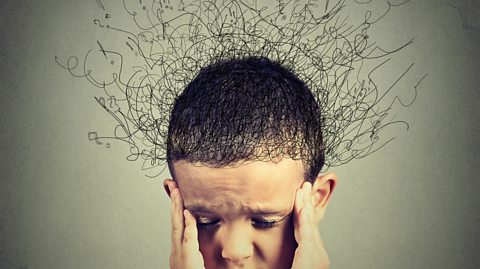Coronavirus has changed the way we live our lives and these past months have weighed heavily on adults. But we should not underestimate the impact on the developing mind of a child.
While a small number of children may have benefited in some ways from being away from school and peer group pressures, many more have struggled with the sudden disruption to their lives.
 Image source, GETTY IMAGES
Image source, GETTY IMAGESThere are those families who have been more adversely affected, including where a child already suffered from anxiety and this has been heightened by the uncertainty and fear felt over recent months and in some cases by the death of a family member.
Common reactions to stress in children: What to look out for?
 Image source, GETTY IMAGES
Image source, GETTY IMAGESAll of this means that some children have been exposed to a series of potentially traumatic events, and they will react to this in various ways. Itās worth bearing in mind that they may be showing common and understandable reactions to stressful experiences, and not necessarily what we would consider to be signs of trauma. These reactions include:
Preoccupations and intrusions: Some children may have memories of things that have happened, and these memories intrude into their consciousness. Some will have unwanted and unwelcome thoughts which they feel they canāt get rid of. These intrusions and preoccupations may prevent them from getting on with their usual activities.
Avoidance: Itās understandable that children try hard not to think about bad things that might have happened to them. They may also try to avoid places, people or activities that trigger unwanted thoughts or memories. Avoidance is an attempt to keep the negative experiences at bay, and it might work in the short term, but for many it doesnāt work indefinitely.
Arousal: When a child is worried about the current situation or things that have happened, they may be on a much higher level of alert throughout the day and night. This means that it will take much less to provoke them to lose their temper or to trigger panic. They may struggle to pay attention to some things, be more jumpy and more vigilant, and find it difficult to turn off, relax and sleep.
Low mood: Some children may have become very low during this time. Even those who have not experienced bereavement will have faced other types of loss. The support of others can really help children to adjust to loss but, during lockdown, some of this support was reduced by the closure of schools and being distanced from friends. Low mood may have become a persistent problem.
Even though we do not see these reactions alone as signs of trauma, they should not be ignored. If your child is experiencing them, they will need your support.
Signs of deeper distress and trauma in children: What to watch for?
 Image source, GETTY IMAGES
Image source, GETTY IMAGESBut if the above is a ānormal reactionā to the past few months, when should parents and carers be particularly concerned? You know your child well, and if you are worried, ask yourself the following questions:
How severe are their difficulties? Do they storm out during an argument and slam the door, or do they become physically violent? Are they restless during their sleep, or do they wake up screaming in terror? Do they appropriately avoid social contact where they can, or do they avoid leaving the house for fear of contracting coronavirus?
How often are they having these difficulties? Do they have a bad dream every 10 days, or several times a night? Do they frequently find it impossible to concentrate during the day, or just occasionally?
How long do the difficulties last? If something upsets them at breakfast, do they go off to their room and return 20 minutes later as if nothing had happened? Or do you not see them again all day? Do they have a fleeting thought about what has upset them, or do they become preoccupied and find it difficult to shift?
How persistent have the difficulties been? How long has this been going on? Are you talking about days and weeks, or weeks and months? And are the difficulties getting better, or worse, or staying the same?

Thinking about your own answers to these questions should start to give you a sense of scale and of how seriously your child may be affected by recent events. If this leaves you feeling more concerned, here are some tips for what to do next:
Talk with your child, so you can find out more and not rely completely on your own observations. Find a place and time when they are most likely to open up and least likely to be interrupted. Ask open-ended questions and be curious. Donāt assume you know the answers.
Make sure your child has accurate information and a balanced understanding of the current situation. You may need to explain some things to them in more detail in a way that they can understand. Perhaps find out what news and social media they are accessing, and what they understand from it.
Maintain family routines and the positive aspects of family life which your child enjoys. These can be really useful because they give children and young people a sense of normality and stability, particularly in times of uncertainty.
As well as the support of trusted adults who care about them, your child may still need and benefit from additional support. Find out more about sources of support via the organisations listed below. Also consider contacting your GP and your childās school, as they will have a good knowledge of local services.
Make sure you have support too, so that you are best able to support your child.
Children often surprise us with their ability to cope with traumatic experiences, and many will cope well with recent events. But equally, it is not a sign of weakness to struggle and sometimes feel overwhelmed.With your care and support, you are playing a hugely important role in creating the best environment for their recovery.

David Trickey is Consultant Clinical Psychologist at the Anna Freud Centre.
For more advice on looking after your mental health during this time, you can visit or For more advice on supporting your child with anxiety, visit
You can get help with bereavement here.

“óĻó“«Ć½ Headroom
Mental health advice for parents of children, teenagers, and children with SEND.

Parents' Toolkit
Fun activities, real-life stories, wellbeing support and loads of helpful advice - we're here for you and your child.

How to use Bitesize Daily
Get the lowdown on our new service to help you learn at home.
